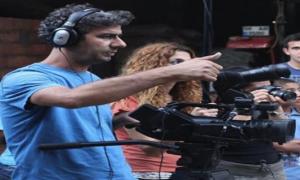
Syrian Kurdish Filmmakers Ready to Produce Movies at Home

ERBIL, Kurdistan Region—With the withdrawal of the Syrian army from the cities and towns in Kurdish regions of the country, some Syrian Kurdish filmmakers in exile feel confident enough to return home and make movies.
There are a number of prominent filmmakers from Syrian Kurdistan, such as Akram Haydo, producer of “Lost Children – Halabja,” Diyar Abdi, producer of “Mesh” and producers Akram Kro and Taymoor Evdiki.
All these filmmakers escaped the Syrian regime and now live abroad, and therefore have not produced any movies about Syrian Kurdistan. With the changes now taking place in the Kurdish regions of Syria, they are now considering movies they can produce at home.
Akram Haydo, who also teaches at the Aram Tigran Cultural Center in Diyarbakir, Turkey, toldRudaw, “Producing a film is very difficult in all parts of Kurdistan, but in Syrian Kurdistan in particular. If the Syrian government does not give you permission, your work doubles in difficulty.”
Haydo added, “So far, no movies have been produced in this part of Kurdistan. But I believe that, with the changes in the area, there will be opportunities to produce Kurdish movies.”
Haydo is currently preparing for a shoot that he said is about the recent situation in Syrian Kurdistan.
Diyar Abdi currently resides in Germany. “Mesh” was shown in festivals and received numerous awards, and Abdi too is looking back to his homeland. “The situation for Kurds in Syria is better than the situation of the Arabs there,” he said.
“I think the Syrian regime is not capable of attacking the Kurds and that is why Syrian Kurdistan is the way it is now,” Abdi added. “But if the regime manages to survive the crisis, then it will be very difficult for the Kurds. I hope Kurdish politicians and intellectuals focus only on unity.”
Abdi talked about future movies he would like to produce in Syrian Kurdistan. “There are many stories of suppression and heroic acts by the people of Syrian Kurdistan,” he said. “I would very much like to produce a movie about the Amouda cinema. I am preparing for it now.”
On Nov. 13, 1960, the Syrian regime forced Kurdish children into a cinema in Amouda to raise funds for the Algerian revolution. When a fire broke out, 250 Kurdish children were burned and another number of others were wounded. Some believe that the fire was set intentionally.
Akram Kro has produced a number of short films, which of which made it to the Cannes Film Festival. Thinking about the future, Kro told Rudaw, “I do not know what the situation will be like, but if the Kurds succeed then many good things will happen.”
“The Kurds have been suppressed for a long time in this part of Kurdistan,” Kro said. “Their culture and language is banned. I believe that if the revolution succeeds, many things will change -- even in the cinema.”
Regarding his projects, Kro said, “I want to work on a number of things. However, I do not want to produce a political movie. I want to produce one that sheds light on the economic and social life of the Kurds. I also want to work on a movie about the situation of the children.”
Taymoor Evdiki, who teaches at the Jiger Xwen Cultural Center in Diyarbakir, said he has also completed the scenario of a new movie that he hopes to shoot soon.
Regarding the future of Syrian Kurdistan, Evdiki said, “No one knows what this revolution will produce. However, if a Kurdish entity is formed, the situation of the Kurds will be much better. This will affect art, and cinema will take a big step forward.”
BY: ZINAR BALIKANI
RUDAW
- 4526 reads


